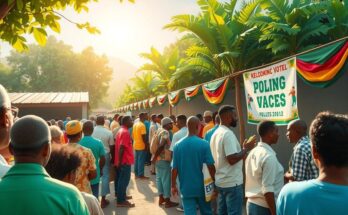Voting for the 39th World Zionist Congress has begun, with Yizhar Hess leading efforts to increase participation within Jewish communities in the U.S. This election runs until May 4, aiming to significantly boost turnout from the low participation seen in 2020. With 21 diverse delegate slates, the election is vital for shaping Jewish organizational funding and policies.
The voting process for the 39th World Zionist Congress (WZC) election commenced in Houston and across the U.S., aimed at fostering increased participation within Jewish communities. Yizhar Hess, the vice chairman of the World Zionist Organization, is spearheading efforts to improve voter turnout, particularly following the previous election’s disappointing figures. The election will proceed from March 10 until May 4, 2023.
Despite a Jewish adult population of approximately 5.8 million in the U.S., only 124,000 ballots were cast in the last WZC election. This figure represents less than 3% participation, highlighting a significant underrepresentation of American Jews. The current voting process is available online at zionistelection.org, where a brief instructional video outlines the registration process. A nominal fee of $5 is required for each voter.
In Texas, the Pew Research Center noted about 176,000 Jewish adults, yet only 2,054 participated in the 2020 election, accounting for less than 1% of eligible voters. To enhance engagement, Hess plans to visit Houston during the Shabbat weekend from March 21-23, attending services at local synagogues to promote voting among the community.
Hess advocates that higher election participation could significantly augment funding for Jewish community activities, including summer camps and educational programs. He stressed the overrepresentation of certain groups in past elections, noting that while Orthodox Jews make up a minority, they captured 20% of the vote in 2020.
The WZC facilitates the allocation of approximately $5 billion every five years to Jewish organizations globally. This year, 525 delegates will be elected, including 200 from Israel and 152 from the U.S., with remaining delegates chosen from other parts of the Diaspora.
Voter eligibility for this election includes being Jewish without adherence to another religion, being at least 18 years old by June 30, 2025, and being a U.S. citizen or legal permanent resident. Voters must also adhere to the Jerusalem Platform, which encompasses a commitment to Zionism and various tenets promoting the Jewish identity and its practices.
This election features a record number of 21 delegate slates, representing diverse perspectives within the Jewish community. The competing slates include beliefs from various branches of Judaism, advocating for pluralism and acceptance in Israel. A notable issue for many American Jews is the pursuit for equitable recognition of their religious practices in Israel, particularly concerning marriage and conversion rights.
This year’s election is especially significant, with American Jews encouraged to influence the distribution of substantial funding for Jewish activities worldwide. Rabbi David Lyon emphasized the importance of participating in the WZO election, remarking that even Jews abroad can shape discussions affecting the future of Jewish life in Israel.
Fifteen candidates from Houston are running in the WZC election, part of a larger contest featuring candidates from various religious denominations and cultural backgrounds. Voting is open online until May 4, 2023, at zionistelection.org, providing a platform for community engagement in determining the future of Jewish organizational funding and policies.
In conclusion, the 39th World Zionist Congress election represents a crucial opportunity for American Jews to participate in shaping their identity and influence the distribution of significant funding for Jewish activities. With efforts led by Yizhar Hess to boost participation, there is a strong call within communities to increase voter turnout from the dismal numbers of previous years. The diversity of candidates and slates reflects the broad spectrum of Jewish thought, emphasizing the importance of inclusivity and representation in determining key policies.
Original Source: jhvonline.com




